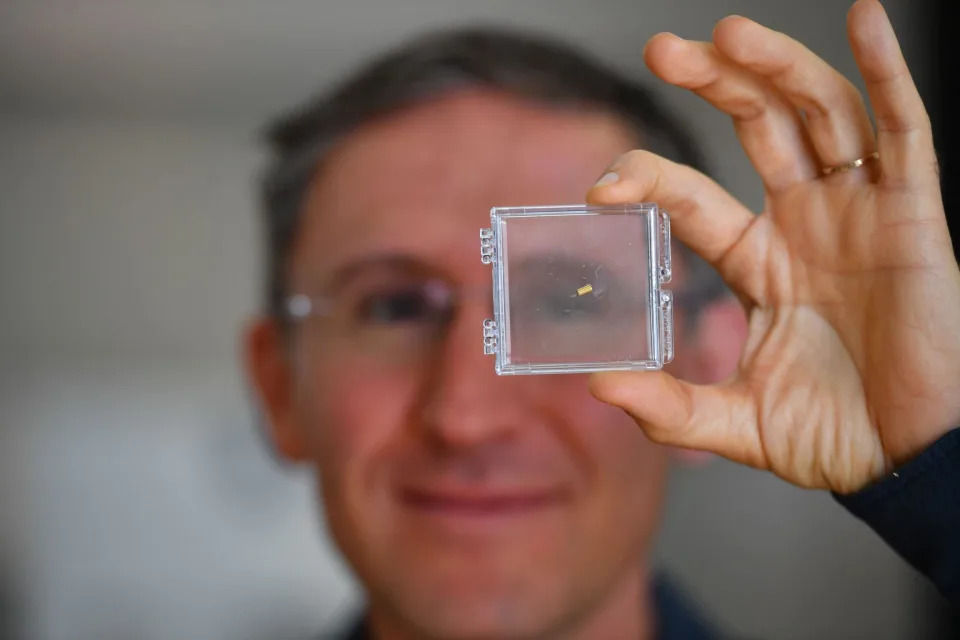Allie Garfinkle
Tue, February 6, 2024

Robyn Beck—AFP/Getty Images
Have you ever seen the movie Fantastic Voyage? I hadn’t, but everyone I talked to at or around medical micro-robots startup Bionaut Labs kept telling me I had to.
Once I watched it, I saw why—the movie, released in 1966 and starring Raquel Welch, is about a futuristic technology allowing people to shrink down, so tiny that they can enter the human body to do surgery. The movie may be psychedelic and far-fetched, but if Bionaut has its way, that future is imminent (sort of).
Bionaut is building micro-robots that precisely deliver drugs to hard-to-reach areas in the human brain. The company’s goal is to build “an elegant solution…that can reach places in the body we previously just couldn’t go,” said Bionaut CEO and cofounder Michael Shpigelmacher.
So far, the company’s animal testing has been successful, and Bionaut has now raised more cash in anticipation of what will be the company’s biggest challenge yet: human clinical trials later this year.
Fortune can exclusively report that Bionaut’s raised an extension round, which involved the Mayo Clinic, along with existing investors Khosla Ventures, Upfront Ventures, and OurCrowd. Fortune has also learned that Bill Gates’ Gates Ventures has invested, per two sources familiar with the matter. (A Gates Ventures representative didn’t return two requests for comment.)
To date, Bionaut has raised over $70 million, Fortune can confirm. In 2022, the company closed its Series B, led by Khosla, bringing the total the company had raised by then to $63.2 million, according to Crunchbase. Bionaut declined to disclose valuation.
Bionaut’s micro-robot is about the size of a grain of rice and is meant to move through the human body’s bloodstream and tissue to deliver drugs far more accurately than we can today. The micro-robot is controlled through magnetism—Bionaut’s scientists and engineers move the robot through the body by tweaking the electromagnetic field.
"We think that this paradigm that we're bringing in time could spawn a whole different generation of ways to treat diseases,” said Shpigelmacher, who previously cofounded PrimeSense, a 3D sensor technology company acquired by Apple in 2013 for a reported $345 million (some reports suggested as much $360 million or $400 million). PrimeSense’s technology became FaceID.
Eventually, the company aims to deliver a wide range of treatments dispersed throughout the body via “the Bionaut.” This in mind, Bionaut’s total addressable market is unknowable, but “any number you came up with would be big enough to justify the investment,” said Samir Kaul, Khosla Ventures founding partner and managing director. OurCrowd CEO and founder Jonathan Medved echoed that sentiment: "What I'm hoping for is that one tenth of the potential is realized.”
In the near-term, the company has decided to focus on the area most requiring precision drug delivery: the brain, with the goal of treating diseases like cancer and Parkinson’s. However, the first use case the company is bringing to bear in clinical trials will be comparatively simple: Dandy-Walker Syndrome, a condition characterized by accumulating brain fluid.
Still, Bionaut faces challenges by nature of what they do—biotech hardware is a famously tough-to-predict sector, said Kazi Y. Helal, PitchBook senior emerging technology analyst.
“They’re shooting for the stars by targeting neurology, so that’s a good moat,” he said. The trouble is, it doesn’t matter if you raise a Series C, D, or make it to an IPO, if you can’t get the technology to provide its practical, promised value.
“That’s the big risk for them, and that’s where I’m a little skeptical,” said Helal. “The validation of raising money’s nice, but what’s real is when it goes into a human and there are no toxic effects. We’re still waiting for that.”
So, is this just a far-fetched, psychedelic fever dream? Bionaut’s offices are decorated with sci-fi movie posters, so I’d say they know they’re dreaming—they just have the conviction to believe they can make their dream come true.
Ultimately, Bionaut’s moonshot is its purpose.
“This is what venture is meant for, right? These kinds of big, audacious ideas––not just functional, incrementally better technologies, but genuinely new modalities, truly revolutionary technologies,” Upfront Ventures partner Kevin Zhang told me.
If Bionaut’s successful, we could be far closer to something that, decades ago, was purely sci-fi. The Fantastic Voyage’s title card reads: “Someday, perhaps tomorrow, fantastic events you are about to see can and will take place.”
Well, perhaps not tomorrow, but maybe someday soon.
No comments:
Post a Comment